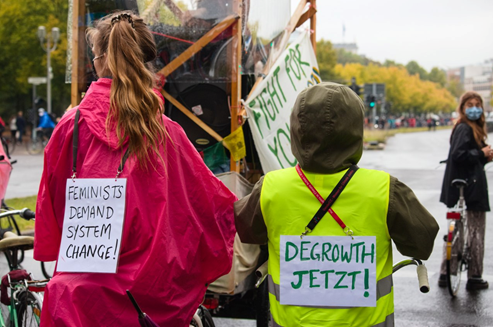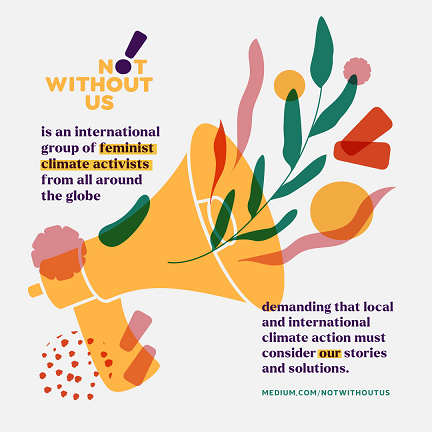
|
GenderCC Newsletter |
December 2020Dear readers,
|
Content
Activities of the Gender and Climate Change Community
News on Gender and Climate Change
|
News from GenderCC |
GenderCC at the FFF Climate Strike on September 25thThe GenderCC secretariat participated in the Fridays for Future climate strike on September 25th, co-organising a queer feminist bike protest. Vera Dickhoff from GenderCC held a speech together with the Kali Feminists about the importance of gender justice within climate justice. Throughout Germany, 200,000 people took to the streets on that day, and more than 2.500 cities worldwide, protesting against the consequences of climate change. |

|
Gender into Urban Climate Change Initiative (GUCCI)The project Gender into Urban Climate Change Initiative (GUCCI) has been running for almost five years. 2020 was supposed to be its final year of implementation. However, due to the Covid-19 pandemic, many of the project activities, especially the in-person ones, were impacted in all four countries part of the project (India, Indonesia, Mexico and South Africa). Therefore, it will still be implemented until mid-2021. A new additional element of the project will be to look at responses to the pandemic at urban levels, and to identify interlinkages between gender, health and climate change. GenderCC is currently compiling and analysing the learnings, challenges and success stories of the project throughout the years, especially in the implementation of the gender assessment methodology GAMMA. This systematisation is going to be publicly available through a handbook on practical steps to implement GAMMA, the launching of a virtual e-learning platform, and the final project report, including its evaluation. As we are currently looking for funding to roll out the approach in additional countries, we would like to ask our members and friends if they are interested to work on gender and climate change at urban levels in their own country, using the approach and experience gathered in the GUCCI project. You can contact us at secretariat@gendercc.net. |
Not without us! Climate justice and gender justice in international climate politicsThe Not Without Us! project has been working on different audio and visual materials in 2020, to make our project participants’ stories more visible and accessible in alternative formats. We launched a medium platform where we are publishing our stories collected throughout the 4 years of implementation of the project. So, follow our page to check our stories, arts, videos and podcast! In this new platform, we also want to invite anyone working or interested in gender and climate to contribute! You can submit your story, be it personal or collective, in written, design or any other format, any language! We will be happy to share it on our page, which is run in cooperation with the Women and Gender Constituency, and with the support of the Rosa Luxemburg Stiftung. |

|
Gender @ UNFCCC |
|
GenderCC has continued its international advocacy work in the UNFCCC process, even with the postponement of 2020’s COP26 due to the Covid-19 pandemic. Since September, we have kept engaging in virtual fora demanding just responses to the intertwined crises we are facing. An important event in this sense was the “COP26 coalition: From the Ground Up”, which reunited thousands of movements and civil society groups from around the globe during 5 days of intense online exchanges. Another important event was the UN Climate Change Dialogues 2020, promoted by the UNFCCC Secretariat, aimed as a platform to showcase progress made in 2020, by Parties and observers, exchange views and ideas, as well as advance implementation of activities mandated for 2020, paving the way for a successful COP 26. During the Dialogues, we promoted the special event “Not without us – feminist voices in climate justice struggles” on November 27th, together with our Not Without Us! project team. Moreover, on December 12th, we celebrated the 5th anniversary of the Paris Agreement, the main international treaty pursuing adequate objectives . The COP26 Presidency organised the Climate Ambition Summit () to celebrate the date. Check the Women and Gender Constituency statement on the Paris Agreement’s adoption and a video campaign on what we demand for a climate and gender just implementation of the Paris Agreement. |
Activities of the Gender and Climate Change Community |
Engendered Landscape Approaches for Climate Justice in Lower Kilimanjaro by Solidaridad East & Central Africa‘’Solidaridad works with the Maasai communities living in the lower Kilimanjaro. The landscape supports livelihoods, like tourism, nature-based enterprises, and pastoralism. The impact of climate change has led to increased droughts, changes in rainfall seasonality, and floods in the region. These are exacerbated by poverty, scarce resources, and cultural norms, that limit women’s ability to benefit from fair resource distribution. Limited gender mainstreaming means gendered dimensions are not integrated in resource planning, or support for women engaging in climate-sensitive economic activities. As a result, they engage in unsustainable practices, such as tree cutting for firewood. Solidaridad believes that women are critical in building community resilience to climate change. However, the lack of enabling transboundary solutions to guide gender integration in climate response planning increases their vulnerability. By providing the right skills and knowledge, we develop the leadership potential of women in the region to become change agents for climate justice.’’ See also: Solidaridad East & Central Africa (2019). Climate Vulnerability Assessment. Sustainable Landscape Innovation (SLI), Tanzania Project. 2018/2019. |
News on Gender and Climate Change |
Klimagerechtigkeit und Feminismus: One struggle, one fight! (in German)This article, written by Isadora Cardoso, Kathrin Henneberger and Lisa Göldner, was part of the special edition of the German newspaper taz, which included articles from diverse climate activists and movements on September 25th, the day of the global climate strike. The article reinforces the need to fight oppressive systems altogether and the importance to build and give power to marginalised feminist groups fighting climate injustices around the world. Read more here. |
Women lead the climate movement. Don’t leave them out of the green recoveryThis opinion’s article by Jesse Firempong and Lydie Padilla showcases “how and why women have been leaders in the climate movement since scientists first realized that carbon dioxide could influence Earth’s temperature — which, by the way, was first theorized by a woman”. Read more here. |
Climate Populism & its LimitsThis article by Kai Bosworth discusses that “while the last ten years of climate justice activism have reinvented (reinvisioned) global environmental politics from the bottom up, it hasn’t been enough to stem the global ecological destruction wrought by capitalism. What can we learn from the successes and failures of this approach?”. Read more here. |
Publications |
The future of advocacy by Women’s Major Group‘’Feminist, women's and girl-led movements and organizations are facing intersecting crises. The COVID-19 pandemic has heightened systemic barriers as well as introduced new challenges to advocacy at all levels. However, members of our collective, around the world, have truly demonstrated feminist tenacity and creativity in adapting their advocacy to respond to the pandemic. After the virtual 2020 High Level Political Forum and over 7 months of advocacy amid the pandemic, the Women's Major Group thought it would be good time to take stock of the diverse tools our members use to do advocacy online and offline. With the goal of mapping out which tools have proven to be effective or ineffective in a world moving online, we held a brainstorming session with our members and conducted a follow-up survey. This briefer summarizes our findings, detailing how feminists are adapting their advocacy tools in response to a virtual world when not everyone is online. Our hope is that this briefer will support our members and allied feminist networks in continuing to adapt their advocacy to ever-changing circumstances as well as raise important questions around inclusivity, systemic barriers, and the future of advocacy.’’ Read here. |
Climate Justice and Migration- Mobility, Development, and Displacement in the Global South by Heinrich Böll Stiftung‘’How should policymakers respond to the reality and future prospect of vast populations being displaced and relocated in an era of global heating? With climate change looming, anxiety over immigration from the Global South is increasingly fuelled by apocalyptic fears of ecological breakdown. This volume offers fresh perspectives on the relationship between climate change and human migration, questioning the pessimistic prisms of ‘security’ and market-oriented approaches to ‘adaptation’ that currently guide policy.'' Read the full report here. |
Advancing feminist economic alternatives for a fair, green, gender equal world, Report Volume 1 by Actionaid‘’It has long been argued that the prevailing economic system serves to both exploit and exacerbate women’s relative position of economic, social and political exclusion. As the world emerges from the Covid-19 pandemic it is crucial that human rights, climate justice and social justice drive social reform. This must redress gender inequalities at the national level as well as power imbalances between the Global North and Global South, which intensify gender inequalities. Feminist economists & activists and women’s rights organisations & movements have been offering economic models to organise economies and engage in economic activity as alternatives to mainstream, orthodox approaches for decades. Through this report we hope to shine a light on just some of the vast multitude of feminist economic alternatives that exist, demonstrating their huge value and providing inspiration and practical examples for policy-makers. You can read volume 1 of the report here.’’ Read the full article here. |
Total solar eclipse in Chile: a brighter outlook for the future? by Vera DickhoffA total solar eclipse on December 14th left the Chilean south briefly in the dark. Between local indigenous groups and the solar industry, the event was affronted with respect and ingenuity. Vera Dickhoff from GenderCC discussed the event and its implications, both to photovoltaics and Chile’s Mapuche peoples. You can read the article here. |
Gender Just Climate Solutions: Celebrating the accomplishments of 15 award winners on the 5th anniversary of the Paris Agreement by the Women and Gender Constituency‘’Five years after the signature of the Paris Agreement, the Women and Gender Constituency is proud to present the accomplishment of 15 award winners who implement Gender Just Climate Solutions all around the world. They showcase climate resilient and transformative development models that bring multiple social and environmental benefits. We know that real solutions to the climate crisis exist on the ground. We demand support for their upscaling and replication, so they can show the way towards more ambitious, rights-based and inclusive climate policies globally.’’ You can find the publication here. |
Spotlight on Gender in NDCs: An analysis of Parties’ instruments, plans and actions supporting integration of gender equality principles and practices by WEDOThis publication aims to outline some of the national structures and systems in place for integrating gender into climate action and serve as a proxy baseline on the potential ability of countries to advance progress on gender-responsive action in addressing the climate crisis in conjunction with the updating and implementation of new Nationally Determined Contributions (NDCs). You can read the full report here. |
|
GenderCC - Women for Climate Justice
Anklamerstr. 38 10115 Berlin Germany info(at)gendercc.net www.gendercc.net
If you would like to subscribe to the GenderCC newsletter please click here.
To unsubscribe, please click here. |